There is no doubt that the rise of the digital age has drastically shaped the way the modern world functions. From enterprise to social interactions and even currency, it seems that every aspect of people’s daily lives is being digitalized in the name of efficiency. But as society becomes increasingly technologically advanced, we must ask ourselves an important question: is such an interconnected system worth putting privacy at risk?
That is the question Edward Snowden, Glenn Greenwald and Noam Chomsky addressed at the UA panel discussion titled “A Conversation on Privacy,”hosted by the UA College of Social and Behavioral Sciences.
With recent news revolving around the Brussels and Paris terrorist attacks, the argument over privacy versus security has never been more polarizing, and Silicon Valley companies seem to be hopping on board by advertising their prioritization of digital privacy.
But as Greenwald revealed at the talk on March 25, global technology companies like Yahoo, Google and Microsoft may not be as trustworthy as they wish to appear, especially when evidence points to them having met with the National Security Agency to build back doors to their users.
“The reason [these companies] were full-scale collaborators [with the NSA] was because they were doing it in the dark,” Greenwald said. “Once the light was shined on what these companies were doing, all of that changed. It didn’t change because these companies suddenly started caring about your privacy—they still don’t care about your privacy. What changed was their fear that if they were perceived as being collaborators, they would lose the next generation of Internet users.”
Snowden, who was broadcasting over video chat from an undisclosed location, made the point that the issue was not necessarily about terrorism, but about keeping a close eye on all citizens, considering there has been many more lives taken per year from police officers than terrorist attacks.
The programs initiated by the U.S. government to capture webcam photos were created in the name of national security, but were caught surveilling photos of individuals without a trace of terrorism, Snowden pointed out. They were instead shown to be moderating pornography trends of people who were considered “radicalizers,” making many skeptics question the integrity of the NSA and its authority on the private lives of citizens.
The activity conducted by the FBI and NSA was deceitful, according to Greenwald. Rather than fulfilling their role of protecting national security and collecting information on potential terrorists, their personal motto seemed to just be “collect it all,” including every conversation and activity exchanged online and over the phone.
Greenwald continued that if we live in a society where privacy is gone, then no one has freedom. There would never be a moment where a person could communicate outside the entrenchment of government.
It appears that even with all the buzz surrounding Internet privacy, millennials seem to be overall indifferent on the issue of their personal information being accessed online.
In a new poll released by the American Press Institute, when asked, “How much do you worry, if at all, about information about you being available online?” 80 percent of millennials reported that they either “worry a little” or “don’t worry at all.”
The reason behind this is people have created a sense of artificial intimacy with their social media. It seems that this intimacy is too strong a bond to break over personal information breach, according to Chomsky.
“There is something deeply wrong with a teen having 200 friends and saying ‘look how social I am,’” Chomsky said.
Even though most people will say that privacy is important to them, they seem to rarely take measures to actually protect that privacy, and that has proven to be a heavily flawed mindset.
“Saying that you don’t care about privacy because you have nothing to hide is like saying you don’t care about freedom of speech because you have nothing to say,” Snowden said.
Follow Arturo Bradic on Twitter.









